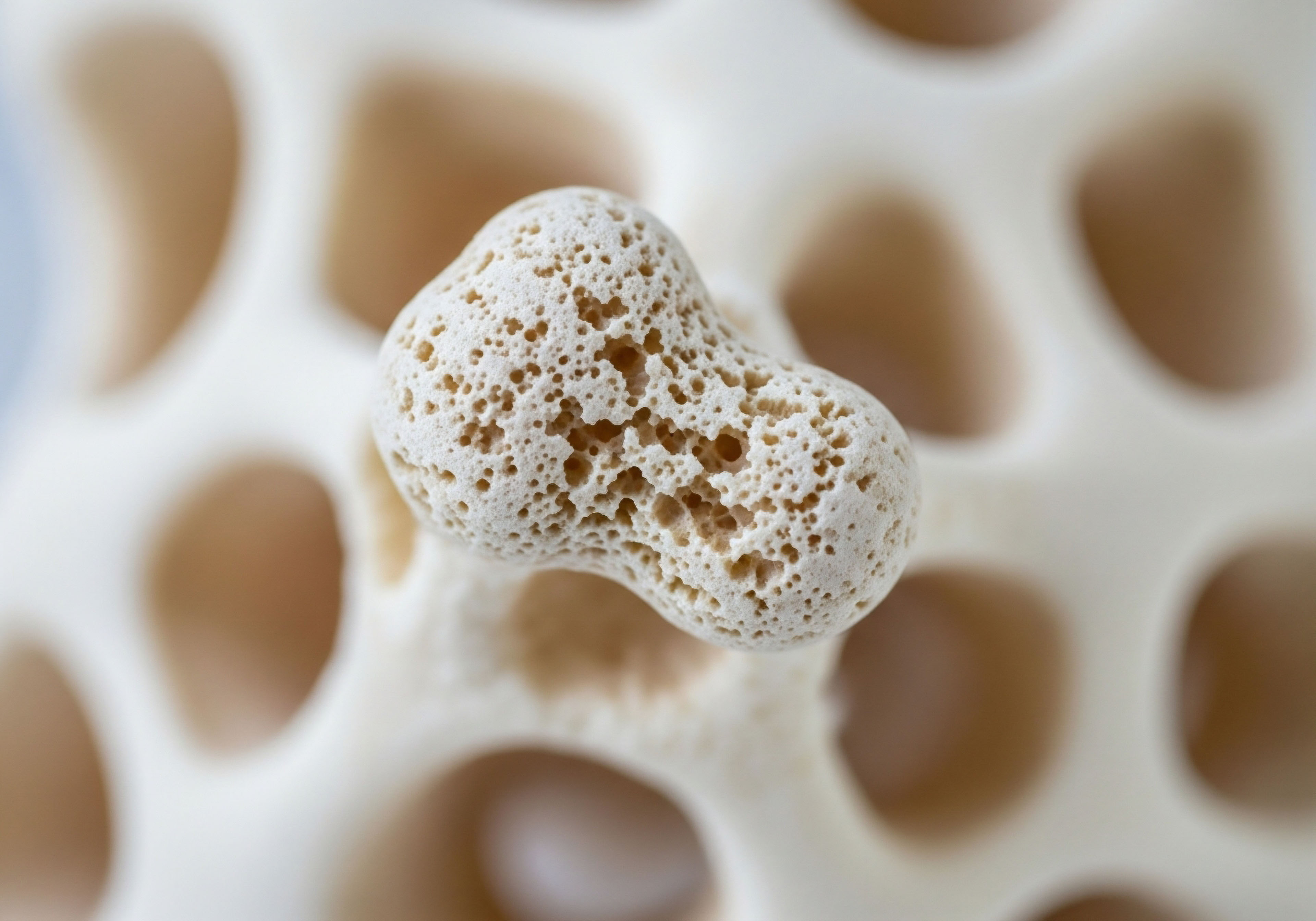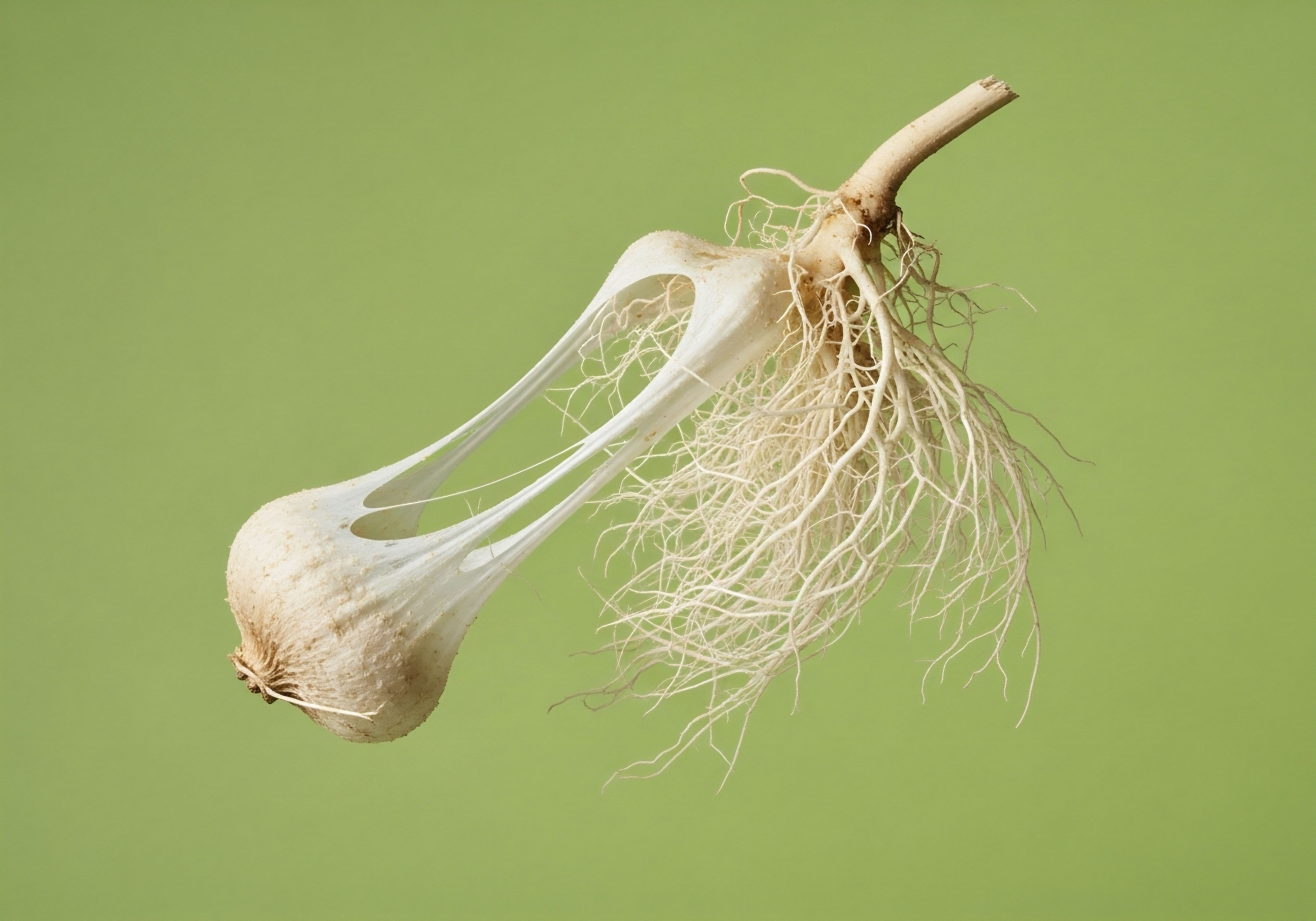

Fundamentals
Living with Polycystic Ovary Syndrome (PCOS) often feels like a constant negotiation with your own body. You may diligently follow advice on diet and exercise, only to see inconsistent or frustrating results. This experience is a valid and common part of the PCOS journey.
The feelings of confusion when your body does not respond as expected are real and deserve a clear explanation. Your unique biology, encoded in your genes, plays a substantial role in this process. Understanding this genetic layer provides a more complete picture of your health, moving beyond generalized advice to a more personalized perspective.
Your genetic blueprint contains specific variations that can influence how your body manages insulin, inflammation, and hormone metabolism, all of which are central to PCOS. These are not defects; they are simply differences in your biological wiring. For instance, some individuals possess genetic variants that make their cells less responsive to insulin.
This is a condition known as insulin resistance. When you have this underlying genetic predisposition, your body must produce higher levels of insulin to manage blood sugar, which in turn can stimulate the ovaries to produce more androgens like testosterone, contributing to many PCOS symptoms. Acknowledging this genetic reality is the first step toward understanding why a standard low-glycemic diet might work wonders for one person but be less effective for you.
Your genetic makeup provides the underlying script for how your body responds to the world, including the food you eat and the exercise you perform.

What Are We Inheriting?
PCOS is recognized as a condition with a strong hereditary component, often observed running in families. Research into families with a history of PCOS reveals that the inheritance is complex. It involves multiple genes, each contributing a small effect, rather than a single gene being responsible for the condition.
This polygenic nature explains the wide variety of symptoms and severity seen among individuals with PCOS. You might inherit a set of genes that primarily affects metabolic function, while a sibling might inherit variants more closely linked to reproductive hormone regulation. These genetic inheritances are not a life sentence but a set of predispositions. They create a specific biological environment that interacts with your lifestyle choices.
The primary genetic factors currently understood to be associated with PCOS fall into several key categories:
- Genes regulating insulin action ∞ Variations in genes like the insulin receptor gene (INSR) can directly impact how efficiently your cells use glucose. This can create a higher baseline for insulin resistance.
- Genes involved in androgen production ∞ Certain genetic markers are linked to higher production of androgens in the ovaries and adrenal glands, which is a core feature of PCOS.
- Genes controlling gonadotropin secretion ∞ The communication between your brain and ovaries is managed by hormones like Luteinizing Hormone (LH). Genetic factors can alter LH levels and function, disrupting the menstrual cycle.
These genetic variations set the stage. They do not, however, write the entire story. Lifestyle interventions, such as diet and exercise, act as powerful modulators of how these genes are expressed. This interaction between your genes and your lifestyle is where the opportunity for personalized wellness truly lies.


Intermediate
To appreciate how genetic factors influence the outcomes of lifestyle interventions in PCOS, we must examine the specific biological pathways involved. Your genetic makeup can create predispositions that either amplify or dampen the effects of dietary changes and physical activity.
For instance, a person with a genetic tendency towards efficient fat storage might find weight management more challenging, requiring a more tailored approach to nutrition and exercise. This is a direct example of a gene-environment interaction, where the “environment” is the lifestyle protocol you are implementing.
A significant area of research focuses on Single Nucleotide Polymorphisms (SNPs), which are the most common type of genetic variation among people. Each SNP represents a difference in a single DNA building block, called a nucleotide.
A specific SNP in the Fat Mass and Obesity-Associated (FTO) gene, for example, has been strongly linked to body mass index (BMI) and the risk of obesity. For a woman with PCOS carrying this particular SNP, a standard calorie-restricted diet may yield slower results in weight loss compared to someone without it.
This knowledge allows for a strategic shift in intervention, perhaps placing a greater emphasis on specific types of physical activity or macronutrient composition to counteract this genetic tendency.
Understanding specific genetic variations allows for a shift from a one-size-fits-all approach to a more precise, bio-individual strategy for managing PCOS.

How Do Genes Mediate Responses to Diet?
The effectiveness of dietary interventions in PCOS is profoundly influenced by genes that regulate metabolism. Insulin resistance is a key feature in a majority of PCOS cases, and its severity can be genetically determined. Variations in genes controlling glucose transport and insulin signaling can dictate how your body handles carbohydrates.
Someone with SNPs that reduce insulin sensitivity may experience more significant improvements in metabolic health and hormonal balance by adopting a diet with a lower glycemic load and higher fiber content. This dietary approach directly addresses the underlying genetic predisposition by minimizing the demand for insulin production.

Key Genetic Influences on Dietary Outcomes
The following table outlines some key genes and their influence on dietary intervention outcomes in the context of PCOS:
| Gene Category | Example Gene | Influence on PCOS and Diet Response |
|---|---|---|
| Insulin Signaling | INSR, IRS1 | Variations can decrease insulin sensitivity, making individuals more responsive to low-glycemic load diets. These diets help manage blood sugar and reduce the hyperinsulinemia that drives androgen excess. |
| Androgen Biosynthesis | CYP11A1, DENND1A | SNPs in these genes can lead to higher baseline androgen levels. Dietary interventions that reduce inflammation, such as those rich in omega-3 fatty acids, may help modulate the expression of these genes. |
| Energy Homeostasis | FTO | Associated with appetite regulation and energy expenditure. Individuals with certain FTO variants may benefit from structured eating plans and mindfulness practices to manage hunger cues, in addition to dietary composition changes. |
| Inflammation | TNFA | Genetic variations can lead to a state of chronic low-grade inflammation. An anti-inflammatory diet, rich in antioxidants and polyphenols, can be particularly effective in mitigating PCOS symptoms in these individuals. |

The Role of Genetics in Exercise Response
Just as with diet, your genetic makeup influences your body’s response to physical activity. Some individuals have a genetic predisposition that favors endurance activities, while others may be better suited for strength training. In the context of PCOS, exercise is a critical tool for improving insulin sensitivity and promoting weight loss.
However, the type and intensity of exercise that will be most effective can be informed by genetics. For example, women with PCOS who have a genetic profile associated with a more significant improvement in insulin sensitivity from high-intensity interval training (HIIT) would be well-advised to incorporate this modality into their routine. This personalized approach can lead to more efficient and sustainable results, fostering a greater sense of agency over one’s health.


Academic
The interaction between genetic polymorphisms and lifestyle interventions in Polycystic Ovary Syndrome represents a complex interplay of molecular endocrinology and metabolic physiology. A deep analysis reveals that the clinical heterogeneity of PCOS is mirrored by its genetic complexity.
Genome-Wide Association Studies (GWAS) have identified numerous loci associated with PCOS, implicating genes involved in gonadotropin action, steroidogenesis, insulin signaling, and chronic inflammation. These findings provide a molecular basis for understanding why a standardized lifestyle intervention can produce profoundly different outcomes in a cohort of women with PCOS.
The concept of epigenetics, or modifications to DNA that do not change the DNA sequence itself but affect gene activity, adds another layer of complexity. These epigenetic changes can be influenced by environmental factors, including diet and exercise, and may be heritable across generations.

Epigenetic Modifications and Intrauterine Programming
The developmental origins of health and disease (DOHaD) hypothesis is particularly relevant to PCOS. Exposure to excess androgens or glucocorticoids in the uterine environment can lead to epigenetic modifications, such as DNA methylation, in the fetus. These changes can permanently alter the expression of genes involved in metabolic and reproductive function, predisposing the individual to PCOS later in life.
For example, hypermethylation of the promoter region of a gene involved in glucose transport could lead to reduced gene expression and contribute to insulin resistance. Lifestyle interventions, particularly those involving specific dietary components like folate and B vitamins, can influence DNA methylation patterns. This suggests that a targeted nutritional strategy could potentially modulate the expression of these epigenetically altered genes, thereby mitigating some of the programmed predispositions.
Epigenetic modifications serve as a molecular bridge between the prenatal environment and the adult manifestation of PCOS, offering a potential target for highly specific lifestyle interventions.

Molecular Mechanisms of Gene-Lifestyle Interactions
The following table details some of the molecular mechanisms through which genetic factors interact with lifestyle interventions to influence PCOS pathophysiology:
| Genetic Locus | Associated Gene | Molecular Mechanism and Interaction with Lifestyle |
|---|---|---|
| DENND1A | DENN/MADD Domain Containing 1A | This gene is a key regulator of androgen biosynthesis. Certain variants are associated with increased androgen production. Lifestyle interventions that reduce insulin levels, such as a ketogenic diet or HIIT, can decrease the insulin-mediated stimulation of thecal cell androgen production, thereby counteracting the genetic predisposition. |
| THADA | Thyroid Adenoma Associated | This locus is associated with both PCOS and type 2 diabetes. Its exact function in PCOS is still under investigation, but it appears to be involved in pancreatic beta-cell function. Exercise-induced improvements in insulin sensitivity can reduce the secretory burden on beta-cells, which may be particularly beneficial for individuals with risk variants at this locus. |
| LHCGR | Luteinizing Hormone/Choriogonadotropin Receptor | Polymorphisms in this gene can alter the sensitivity of the ovaries to LH, contributing to anovulation. Lifestyle interventions that lead to weight loss can improve the hormonal milieu, potentially restoring a more regular pattern of gonadotropin secretion and improving ovarian response. |
| FSHR | Follicle-Stimulating Hormone Receptor | Variants in this gene can affect ovarian response to FSH, impacting follicular development. While lifestyle changes do not directly alter the receptor’s structure, they can improve the overall metabolic environment, which may enhance the signaling efficiency of the FSH-FSHR pathway. |

What Is the Future of Personalized PCOS Management?
The future of PCOS management lies in the integration of genomic and metabolomic data to create truly personalized intervention strategies. By understanding an individual’s unique genetic and epigenetic profile, clinicians can move beyond broad recommendations to prescribe specific dietary compositions, exercise modalities, and even targeted supplementation that directly address the underlying molecular drivers of their PCOS phenotype.
This approach has the potential to dramatically improve the efficacy of lifestyle interventions, reduce the time to achieve clinical goals, and empower individuals with a deeper understanding of their own biology. Research continues to unravel the intricate genetic architecture of PCOS, paving the way for a new era of precision medicine in women’s health.

References
- Dunaif, A. & Fauser, B. C. (2013). Renaming PCOS ∞ a two-state solution. The Journal of Clinical Endocrinology & Metabolism, 98(11), 4325-4328.
- Day, F. Karaderi, T. Jones, M. R. Meun, C. He, C. Drong, A. & Scott, R. A. (2018). Large-scale genome-wide meta-analysis of polycystic ovary syndrome suggests shared genetic architecture for different diagnosis criteria. PLoS genetics, 14(12), e1007813.
- Diamanti-Kandarakis, E. & Dunaif, A. (2012). Insulin resistance and the polycystic ovary syndrome revisited ∞ an update on mechanisms and implications. Endocrine reviews, 33(6), 981-1030.
- Legro, R. S. Arslanian, S. A. Ehrmann, D. A. Hoeger, K. M. Murad, M. H. Pasquali, R. & Welt, C. K. (2013). Diagnosis and treatment of polycystic ovary syndrome ∞ an Endocrine Society clinical practice guideline. The Journal of Clinical Endocrinology & Metabolism, 98(12), 4565-4592.
- Hayes, M. G. Urbanek, M. Ehrmann, D. A. Armstrong, L. L. Lee, J. Y. Sisk, R. & Legro, R. S. (2015). Genome-wide association of polycystic ovary syndrome implicates alterations in gonadotropin secretion in European ancestry populations. Nature communications, 6(1), 7502.
- Vink, J. M. Sadrzadeh, S. Lambalk, C. B. & Boomsma, D. I. (2006). Heritability of polycystic ovary syndrome in a Dutch twin-family study. The Journal of Clinical Endocrinology & Metabolism, 91(6), 2100-2104.
- Azziz, R. Carmina, E. Chen, Z. Dunaif, A. Laven, J. S. Legro, R. S. & Yildiz, B. O. (2016). Polycystic ovary syndrome. Nature reviews Disease primers, 2(1), 1-18.
- Stepto, N. K. Cassar, S. Joham, A. E. Hutchison, S. K. Harrison, C. L. Goldstein, R. F. & Teede, H. J. (2013). Women with polycystic ovary syndrome have intrinsic insulin resistance on euglycaemic-hyperinsulinaemic clamp. Human reproduction, 28(3), 777-784.
- Barber, T. M. McCarthy, M. I. Wass, J. A. & Franks, S. (2006). Obesity and polycystic ovary syndrome. Clinical endocrinology, 65(2), 137-145.
- Walters, K. A. Gilchrist, R. B. & Handelsman, D. J. (2018). The polycystic ovary syndrome ∞ a neuroendocrine disorder of ovarian origins. The Journal of Clinical Endocrinology & Metabolism, 103(12), 4333-4348.

Reflection
The information presented here provides a framework for understanding the biological currents that flow beneath the surface of your daily experiences with PCOS. Your body is not working against you; it is operating according to a specific set of genetic instructions that have been passed down through generations.
This knowledge can be a powerful catalyst for shifting your perspective. Instead of viewing your health journey as a battle, you can begin to see it as a process of discovery. Each response to a dietary change or a new exercise routine is a piece of data, a clue to your unique biological code.
This understanding transforms frustration into curiosity and empowers you to become an active participant in your own wellness, seeking strategies that are not just generally effective, but specifically effective for you.



